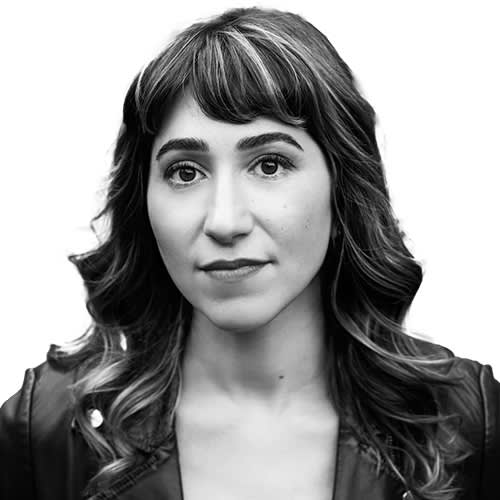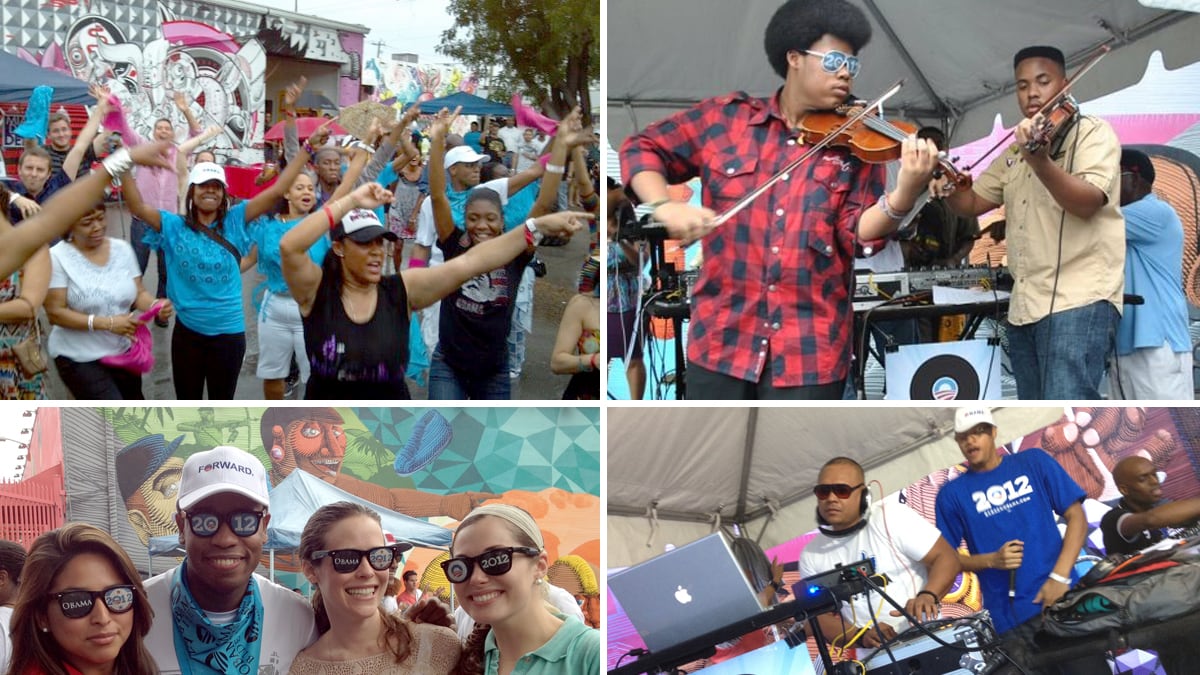
Deejays for Obama may sound like a Chappelle Show parody, but it’s an actual thing–just not one his campaign wants to talk about.
The effort, intended to appeal to young prospective voters of color, is one part of a targeted push by the Obama campaign this time around to appeal to sectors of the electorate who turned out in force for Obama in 2008—young voters, voters of color, and single women among them. Unlike in 2008, the Obama 2012 campaign has vote directors targeting each of these niches, and organizing grassroots efforts like an urban DJs movement.
A quick Google search shows the new group is not secret, and yet when I reached out to the Obama campaign about this, spokeswoman Charly Norton initially denied such a movement existed. The campaign finally acknowledged the effort’s existence but declined to say if it was coordinated or sanctioned by them—though participants and organizers believed they were working for it.
Which is how I found myself at the second annual Grace Jamaican Jerk festival in Queens, New York, to talk with DJ Dubmaster Chris—one of two DJs there affiliated with Deejays for Obama along with DJ Roy—who was calling out to the crowd after a gospel set: “Give me a wave for Jesus Christ."
A deejay for Irie Jams 93.5 in New York for nearly all of its 19 years on air, Dubmaster talked with me for a bit, when the campaign would not, about Deejays for Obama. The group has already held at least two smaller events in New York along with one larger one in Miami.
"We know that Obama has brought a new energy into our community. A lot of deejays have come together to give him that support," said Dubmaster.
The group, which includes deejays who spin reggae, soca, dance hall, hip hop, and funk, seems intended to help reignite the fire that sent the biggest turnout of minority and young voters ever to the polls in 2008. That was the year of “hope” and besting history’s odds to sweep the first black president into office.
Faced with polls showing less enthusiasm for the now incumbent president among some core supporters, the deejays are part of the push to ensure those voters turn out again to support Obama this time. While his campaign is ubiquitous on college campuses, the turntablists can help the campaign connect with a hard-to-reach demographic of late teen to early 20s voters who aren’t enrolled in college.
While African Americans are less likely to be registered voters than members of other racial and ethnic groups, those who are registered are among the most likely to actually vote, according to a recent report by the National Urban League. Whether they will turn out in the same numbers they did in 2008, when their support helped elect the first black president, could be crucial this year in swing states including North Carolina, Pennsylvania, Ohio, and Florida.
Marlon Hill, an entertainment lawyer and early 2008 Obama supporter and grassroots organizer is helping this year to assemble the deejays for Obama event in Miami, and to put together an array of deejays nationwide willing to spin for free at fundraisers to reelect the president.
Politics as a whole is distasteful to many people,” particularly young ones, says Hill—who threw a graffiti-speckled bash and small-dollar fundraiser for the president in Miami where more than 20 deejays spun brief sets for a crowd of around 400. “Deejays are like any other professional. They are an important part of communicating messages to different communities,” he added, pointing to South Florida’s rich cultural soup of Hispanic and African American voters.
Deejays for Obama so far has 40 deejays from Florida, New York, Maryland, D.C., Ohio, Arizona, Pennsylvania, and Massachusetts participating, according to Hill.
“You bring them to the party, but while they’re at the party, you give them tools to spread word about the campaign,” said executive director of the Miami-Dade Democratic Party, Cedric McMinn.
McMinn says he’s used DJs and their followings to register first-time voters who favor Obama in South Florida, parking a table, buttons and sometimes a life-sized cutout of the President outside of nightclubs to catch partiers on their way in. Since fundraising and grassroots events brim with the already-converted, McMinn and others take advantage of music venues to capture new voters where they go for fun—before they “get too drunk,” he adds.
“You don’t want to stay there too late, people get all liquored up. You don’t want them writing the wrong information on the form,” said McMinn who estimated that two or three hours outside a club could add up to 30 or 40 newly minted voters.
Richard Dryden, who performs under the moniker DJ Treats, spun at three fundraisers for the 2008 campaign in New York. He says guests loved Stevie Wonder, Blondie, and MIA and that the vibe for his sets was like “filling your living room with a bunch of your friends.”
He says professional deejays should be able to read the crowd at the event they’ve been hired to soundtrack, and to deliver what they want. “I should be able to give you my actual talent and not have you treat me like a jukebox,” he said, adding that the campaign loved what he did and didn’t modify his work at all.
Anton Moore, who has booked deejays for Obama campaign office openings and grassroots events in the Philadelphia area, says dance music is best, and that his deejays mostly “play it safe” with crowd-pleasers that come with built-in dances—The Wobble, The Cupid Shuffle and the 1976 classic and bar mitzvah staple, The Electric Slide.“People like those songs and if there’s a dull moment, people just get up and start dancing to those songs,” said Moore of the intergenerational crowd these functions tend to draw. "You got to know how to cater to your audience. No dirty records,” he said, ruling out anything “derogatory” or with “cuss words.”
Before they can perform at an OFA-sponsored event, dejays undergo vetting by the campaign, according to Hill. The ones who performed at the Miami block party paid their taxes, had clean criminal records and had never performed at “unsavory venues,” he said.
The New York launch of DeeJays for Obama, scheduled for some point after the convention, once the campaign has “officially” rolled out the Deejays for Obama program, is expected to feature a good deal of hip hop, or “universal music” as Dryden put it. So far, just two DJs have signed on Dubmaster Chris and DJ Roy, though others than expected. He added that he nonetheless understands why Obama’s and other campaigns “tip toe” around it since the language and themes can be rough, explicit and misogynistic.
But, he says, “Obama cannot speak to an 18-year-old the way Jay-Z can.”
Obama in fact gave what rappers call a “subliminal” nod to Jay-Z in 2008, when he physically brushed imaginary dirt from his shoulders in response to a Hillary Clinton attack, a gesture that seemed to allude to the Jay-Z hit song and video of a few years earlier, Dirt Off Your Shoulder. (Hook: “If you feeling like a pimp n--, go and brush your shoulders off / Ladies is pimps too, go and brush your shoulders off / N-- is crazy baby, don't forget that boy told you / Get, that, dirt off your shoulder.”)
A campaign spokesman later confirmed: “He has some Jay-Z on his iPod.”
While the Romney campaign has no similar effort, both camps have released Spotify playlists detailing what’s on the candidates’ iPods (or at least what songs the respective campaigns want to be associated with). Romney rocks to Tim McGraw, Kid Rock (who played an event for him in Michigan) and Toby Keith, while Obama has Beyoncé, K’naan, Will.i.am and Al Green (the president’s “Let’s Stay Together” a cappella riff has already become a campaign-peddled ringtone). Musicians whose fans are most likely to be Republicans include Tim McGraw, Elvis Presley and Kenny Chesney, while Bob Marley, Rhianna, and Jay-Z aficionados are more sure to be Democrats, according music data company, The Echo Nest, which claims on its website to “know more about music content and consumers than anyone.”
“Any politician who needs to reach the African-American, Latino, or any community underrepresented politically in urban centers, they need to be aware of hip hop and acknowledge it publicly in a positive sense,” said Dryden.
Dubmaster says Jamaican music’s “ghetto perspective” is as old as Bob Marley, and key to understanding those who come from “humble beginnings.”
“Speak[ing] for the folks in the ghetto has always been a big part of our music. That’s definitely going to continue,” he said.





